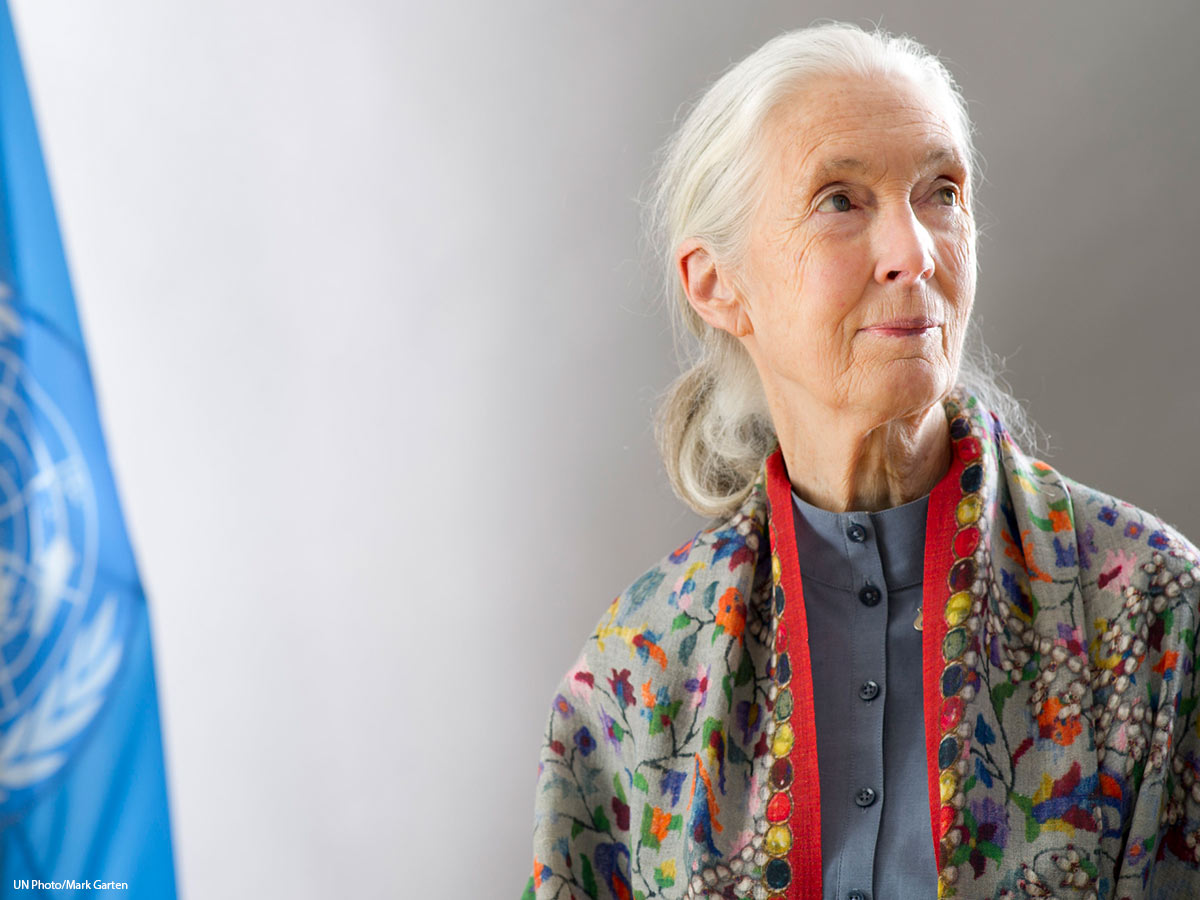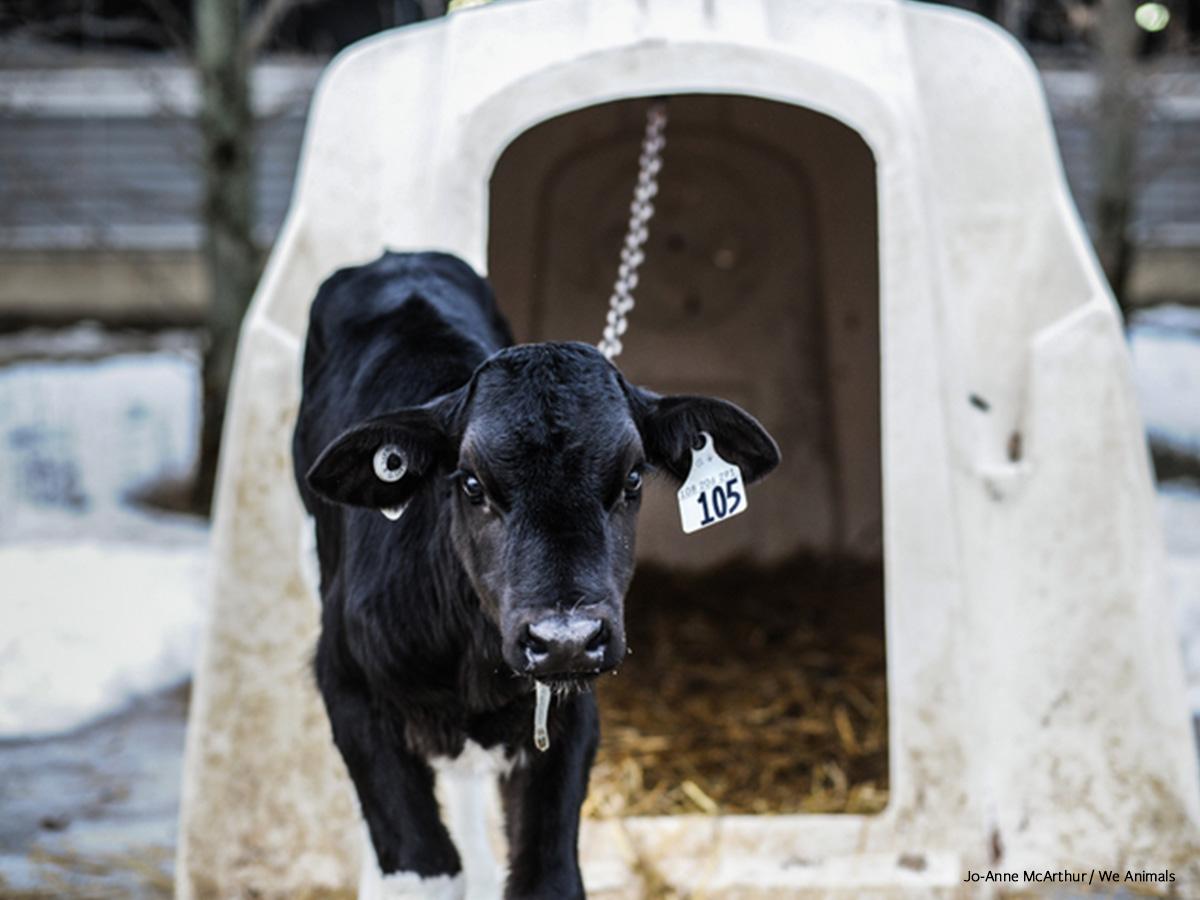MEDIA RELEASE: Jane Goodall Among 80+ Leaders in Animal Advocacy & Conservation Calling for AP Stylebook Update
SAN RAFAEL, Calif. (March 25, 2021) — In Defense of Animals and Animals & Media have partnered to call for an update to the Associated Press Stylebook’s recommendation on the use of personal pronouns for nonhuman animals. They are joined by more than 80 respected leaders and scholars in animal advocacy and conservation across the globe who support this change, including renowned primatologist Dr. Jane Goodall, biologists Dr. Marc Bekoff and Dr. Jonathan Balcombe, and leaders of organizations such as Center for Biological Diversity, Animal Legal Defense Fund, Mercy For Animals, Encompass, Animals & Society Institute, Animal Outlook, Nonhuman Rights Project, Center for Animal Law Studies at Lewis & Clark Law School, and media organizations, such as Sentient Media, We Animals Media, the Journal of Critical Animal Studies and Animal Sentience journal.
The scientific consensus is that nonhuman animals are conscious beings — someone not something — and the language we use should reflect that.
Dr. Jane Goodall, DBE, founder of the Jane Goodall Institute & U.N. Messenger of Peace, said:
When I began my research and shared it at Cambridge, I was told that my findings and approaches, including giving the chimpanzees names, were wrong. I was also told that surely the realizations that chimpanzees have individuality and emotions were wrong — at the time it was believed that other animals were essentially automatons devoid of complexity and very different from humans. How wrong they all were. Thankfully, we have come very far in our understanding of the other animals with whom we share this planet. We know that they feel joy, pain, grieve, and demonstrate compassion and altruism. We are not separate in kind from other species, but rather by mere degree. I've spent my life working to grow respect for nonhuman animals, and to ensure a future for the complex tapestry of life on Earth, but as we face devastating losses and cruelty to individuals and species, we must do everything we can to help people recognize the sentience and innate value of other animals. I've often said that to make change you must reach the heart, and to reach the heart you must tell stories. The way we write about other animals shapes the way we see them — we must recognize that every individual nonhuman animal is a 'who,' not a 'what.' I hope that we can advance our standards in this regard globally to refer to animals as individuals, and no longer refer to them as objects, so that the stories we tell spark compassion and action for these fellow beings.

The current guidance on the use of personal pronouns for nonhuman animals recommended by the widely-used and respected AP Stylebook, which instructs writers not to “apply a personal pronoun to a nonhuman animal unless its sex has been established or the animal has a name,” is far too narrow and routinely results in inaccurate and objectifying descriptions of fellow nonhuman animals.
Instead, the guidance should be to use she/her/hers and he/him/his when their sex is known, regardless of species, and the gender-neutral they, or he/she, or his/hers when their sex is unknown.
“By avoiding the inaccurate use of the word it, this update would reflect the fact that nonhuman animals are sentient beings, and encourage dialogue about how to respect and protect them and their rights and interests, and to shape a more equitable world,” said Debra Merskin, Ph.D., media scholar and co-author of Animals & Media.
“At Animals & Media, for more respectful and inclusive coverage, we suggest that the AP replace its section on Animals with the following: ‘Animals. While each animal species and individual, including humans, is unique, all animals share a status as fellow sentient beings. To avoid an anthropocentric (speciesist) bias against nonhuman animal species, the interests of nonhuman animals should be included in stories affecting them. Treatment of animals should be evenhanded, non-condescending, and free of assumptions and stereotypes,’” said Carrie P. Freeman, Ph.D., media scholar and co-author of Animals & Media.
Mass media, which defaults to the AP Stylebook in particular, has a great influence on public perception and therefore has not only an enormous responsibility, but also an ethical obligation, as outlined in the Society for Professional Journalists’ Code of Ethics, to give a “voice to the voiceless” by portraying nonhuman animals as precisely as possible.
“Nonhuman animals aren't inanimate disposable objects, but rather they are sentient and feeling beings. They should not be referred to as ‘which,’ ‘that,’ or ‘it,’ but rather as ‘who’ or ‘whom,’ and they should be named and not numbered, just as we do for a wide variety of companion animals. Words matter and these simple guidelines can, and do, go a long way toward garnering respect, compassion, and empathy for other animals whose lives mean as much to them as ours do to us,” said Marc Bekoff, Ph.D., professor emeritus of ecology and evolutionary biology at the University of Colorado, Boulder.
“Our actions directly affect animals every single day, but we’ve become distanced from the impact we’re having on them and the widespread injustices they’re regularly subjected to. So much of the information we’re exposed to doesn’t accurately portray animals as living, breathing, feeling individuals whose lives matter to them, or their lived experiences — and that’s perpetuating their suffering and exploitation on an incomprehensible scale,” said Alicia Graef, of In Defense of Animals. “If we’re to have hope of turning the trajectory we’re on now around, we have to recognize the consciousness, needs and rights of animals, whether we’re talking about the tiniest mice used in animal experiments, the millions of land and aquatic animals who are raised and killed in an inherently cruel and unsustainable agricultural system, our companion animals, or wild animals who need us to protect them and their habitats more than ever.”
“Encouraging people to be mindful of the language they use surrounding animals is a big part of our mission, and a particularly important part of our Guardians campaign, which is the legacy of our founder Dr. Elliot Katz’s work to protect animals,” said Marilyn Kroplick, M.D., President of In Defense of Animals. “We’re so thrilled to see so much support for more inclusive, respectful language to be used more broadly, and especially in the media, to reflect the fact that animals aren’t objects, but conscious beings.”
In Defense of Animals and Animals & Media have called for this change in an open letter supported by more than 80 leaders in animal advocacy and conservation that was delivered to Paula Froke, Editor of The Associated Press Stylebook and executive director of The Associated Press Media Editors on Monday, March 22.
Read the Open Letter: https://www.idausa.org/OpenLetterAP
Contacts:
Alicia Graef, In Defense of Animals, 802-578-6894, guardian@idausa.org
Carrie Freeman, Animals & Media, 404-644-6633, cpfreeman@gsu.edu
Debra Merskin, Animals & Media, 541-968-8646, dmerskin@uoregon.edu
In Defense of Animals is an international animal protection organization with over 250,000 supporters and a 37-year history of fighting for animals, people and the environment through education, campaigns and hands-on rescue facilities in India, South Korea, and rural Mississippi. www.idausa.org/guardian
Animals & Media is a style guideline web resource for media professionals recommending best practices for respectfully and accurately representing nonhuman animals and their issues in journalism, entertainment programming, public relations campaigns, and advertisements. It is an open access resource co-authored by media professors Dr. Debra Merskin (Univ of Oregon) and Dr. Carrie P. Freeman (Georgia State Univ) to apply communication scholarship toward improving communication practice in the real world. www.animalsandmedia.org


